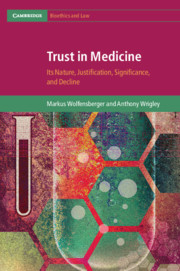Book contents
- Trust in Medicine
- Cambridge Bioethics and Law
- Trust in Medicine
- Copyright page
- Dedication
- Contents
- Figures
- Tables
- Preface
- Acknowledgements
- A Note on Usage
- Part I Introduction
- Part II The Nature of Trust
- Part III Justification of Trust
- Part IV Significance of Trust
- Part V The Decline of Trust
- 12 Reasons for the Decline of Trust
- Part VI Perspectives
- References
- Index
- Series page
12 - Reasons for the Decline of Trust
from Part V - The Decline of Trust
Published online by Cambridge University Press: 19 August 2019
- Trust in Medicine
- Cambridge Bioethics and Law
- Trust in Medicine
- Copyright page
- Dedication
- Contents
- Figures
- Tables
- Preface
- Acknowledgements
- A Note on Usage
- Part I Introduction
- Part II The Nature of Trust
- Part III Justification of Trust
- Part IV Significance of Trust
- Part V The Decline of Trust
- 12 Reasons for the Decline of Trust
- Part VI Perspectives
- References
- Index
- Series page
Summary
In this chapter, the authors present five changes in people’s attitude and behaviour, which not only can explain the decline of trust, but which must almost inevitably lead to a decline of trust. The first four changes may be summarised under the heading ‘loss of physicians’ authority’: (1) the discrediting of ‘professionalism’, which has led to a decline of professional authority; (2) the insistence on (and difficulty of) assessing physicians’ trustworthiness and the loss of merit-based authority; (3) a questioning of physicians’ medical authority caused by the disavowal of the basic tenets of scientific medicine (often referred to as the ‘crisis of modern medicine’); (4) increasing doubts regarding the physician’s agency and directive authority caused by the perceived commodification of medicine and a reconceptualisation of physicians as dependent employees. The fifth change refers to changes of risk perception and increasing risk-averseness. Contrary to what many believe, it is not risks which have increased, but uncertainty. Yet, people perceive this increase of uncertainty as an increase of risk – a risk which an increasing number of people are no longer willing to accept.
Keywords
- Type
- Chapter
- Information
- Trust in MedicineIts Nature, Justification, Significance, and Decline, pp. 173 - 204Publisher: Cambridge University PressPrint publication year: 2019

